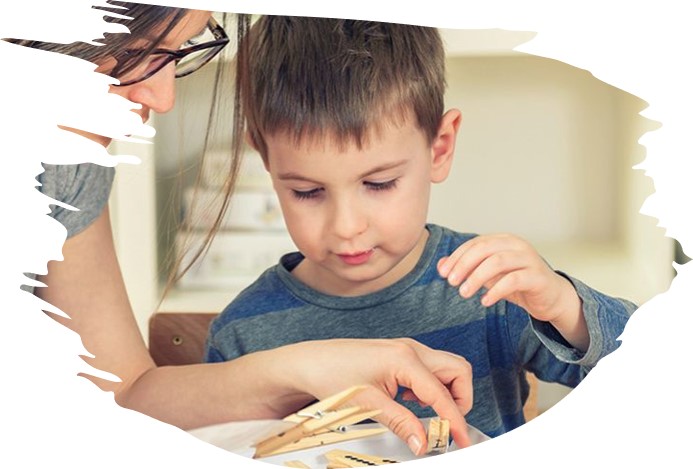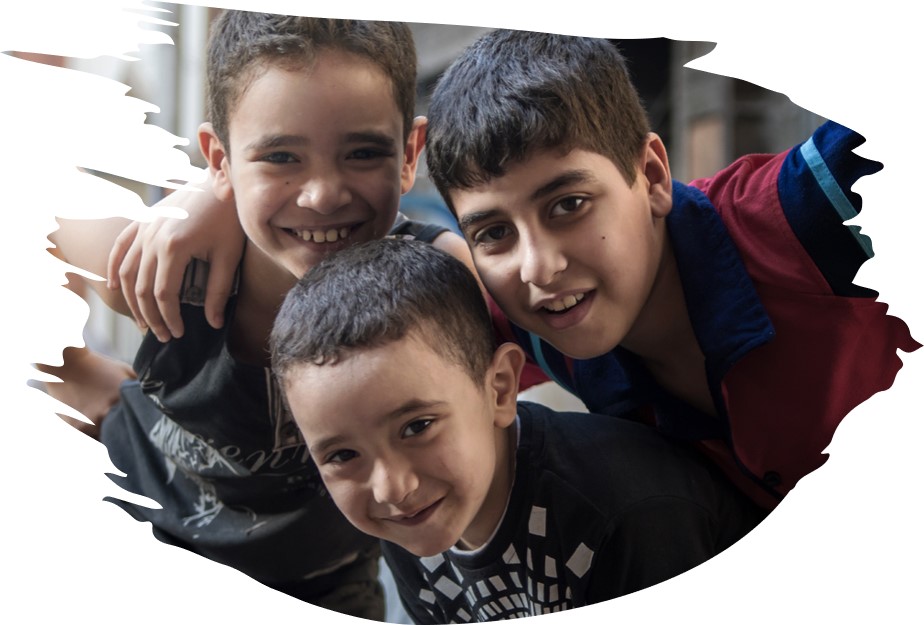Different Types of Fostering
There are many different types of foster care, and at Tutis we take special care to ensure that we support each child and young persons specific needs. Our training and support given to all of our foster carers is tailored to their specific needs around the type of foster care they provide.

What is Short Term Foster Care?
Short term fostering is one of the most common types of fostering available in the UK, with thousands of children in need of short-term foster care every year.
Short-term foster care provides children and young people with a stable, safe, and supportive home when they are unable to live with their birth family. This type of fostering is often only temporary, while arrangements for their future are being made.
Securing A Better Future
There is much to consider when figuring out the kind of support a child or young person needs to have a successful future. During a short-term fostering arrangement, lots of people (including the child’s family, the Local Authority, and various professionals) work together to find a long-term solution.
The aim of short-term fostering is to eventually return the child or young person to their birth family, with the right kind of support. However, this isn’t always possible. If a foster child is unable to return to their foster family, they might need to move into a different type of foster care arrangement – like long-term fostering .
.
At Tutis, we’re proud to place our children at the centre of our decision making. We work hard to make sure that every decision we make respects the needs, wishes and wellbeing of our children and young people – providing them with everything they need to secure a better future.
Why Do Children Need Short Term Fostering?
Children and young people often come into foster care because they are unable to live with their birth family. In 2022, there were over 404,310 children living away from home in the UK.
There are many reasons why a child or young person may be unable to live with their family. These include signs of abuse or neglect, family illness, family dysfunction, or circumstances within which the home environment is considered unsafe or unsuitable.
Fortunately, short-term fostering provides children and young people with a safe home to live in while any issues are sorted out, or more permanent arrangements can be made.

Long Term Fostering
Another common fostering option is long term fostering, which is where foster children remain with their foster family for an extended period of time. This is an ideal option for many children and young people in care, as it provides them with the opportunity to experience a secure and loving home. Long term fostering is also a great alternative for adoption. During this time, foster children benefit from the security and support of a loving home – something they may have been unable to experience otherwise.
What is Long Term Foster Care?
Long term foster care often takes place when a child or young person cannot return to their birth family, or when adoption is not a possibility. Children and young people living in long term fostering arrangements typically stay with their foster families until they move on from care at the age of 18 years old.
However, unlike adoption, when it comes to long term fostering, the foster family don’t have legal responsibility over the foster child. This is because fostering doesn’t end the birth parent’s legal relationship with the child.
Throughout the fostering arrangement, the foster family continues to work in partnership with the young person’s Local Authority, birth family and service professionals – ensuring the young person receives the wrap-around support they need.
What are the Benefits of Long Term Fostering?
Many children and young people come into foster care having experienced trauma, such as abuse or neglect. They may suffer from attachment issues, challenging behaviour, or even additional learning difficulties like as a result.
Fortunately, long term foster care provides young people with the space, time, and stability they need to understand and work through some of this trauma and achieve better outcomes.

Emergency Fostering
In many instances, a child or a young person may be brought into foster care due to unforeseen emergencies. Emergency fostering often happens with very short notice, with little time to prepare. The placement can last for a night or even a few weeks, with the potential to turn long-term depending on family circumstances.
What is Emergency Foster Care?
There are many reasons children are brought into care and often this can be with short notice and with little time to prepare. Emergency foster care is put in place when a young person has to be removed from their home immediately. They then will be brought to live somewhere safe and stable with a foster family whilst problems at home are investigated.
Due to the nature of the child being taken into care, emergency foster care will not give foster parents the opportunity to meet or find out a huge amount of information about a young person before they are brought to your home.
Emergency foster care can last just one night, a few days or may even turn into a lengthier short-term arrangement. Sometimes these placements can develop into longer periods of a few months, or longer-term, depending on family circumstances.
What do emergency foster parents do?
Being removed from your home can be very upsetting for a child, even if they were removed for their own safety. You will need to be able to provide a warm, welcoming and stable home environment for them.
Emergency foster parents need to be prepared for a phone call day or night, as these types of arrangements can be made at any time. Many children who need emergency foster care will be brought to you by a local authority duty social worker or even the police.
For a child to be taken into care at an emergency level will likely mean they are very scared and may have their own challenging behaviour due a difficult home life. Tutis Foster Care work with our emergency foster carers to prepare for emergency arrangements and offer support through this transition period.
If you think you have what it takes to be an emergency foster parent, please get in touch with us. We are looking for resilient, caring people to join the Tutis family, and pay a very generous fostering allowance.

Respite Fostering
Respite foster care is when children who may or may not already be in foster care, take a short-term stay with another foster family, this can be to give their primary foster carer a break. Respite fostering usually only occurs for a couple of days, so that foster carers are given the chance to rewind and not become overwhelmed. Respite fostering is extremely valuable if the foster family is experiencing difficulties.
Sometime a Respite Foster Placement might be needed for a child or children who are not already in foster care, it might be that they live with a single parent, who for numerous reasons may not be able to care for their children for a short period, and there are no other suitable adults in the family or wider support group who are able to look after them. At Tutis we do have carers who only offer Respite Care.
Why is Respite Fostering Necessary?
Respite fostering supports foster families by affording them the opportunity to take some time to unwind and recharge their batteries. It also provides essential support in situations where a foster family may be experiencing difficulties, and a little space is needed.
Our respite carers provide short-term care for children and young people within their local network of Tutis foster carers. Generally, respite foster care takes place over a short period – between a couple of days to a couple of weeks. This is often over weekends, or during school holidays.
While we strive to provide our foster carers with all of the support necessary for fostering arrangements to succeed, sometimes taking a short break can be beneficial for both our both foster children and their foster families.
Benefits of Respite Fostering
Respite care for foster parents and foster children has many benefits, including:
![]() Providing some space for foster families who are experiencing difficulty and are in need of a short break.
Providing some space for foster families who are experiencing difficulty and are in need of a short break.
![]() Enabling foster carers to take some time to themselves and recharge their batteries.
Enabling foster carers to take some time to themselves and recharge their batteries.
![]() Offers foster children the opportunity to gain some new positive experiences.
Offers foster children the opportunity to gain some new positive experiences.
![]() Provides foster children with the chance to develop a new positive, secure and trusting relationship with another adult in their life.
Provides foster children with the chance to develop a new positive, secure and trusting relationship with another adult in their life.

Therapeutic Fostering
Therapeutic fostering is an arrangement for children or young people who have experienced significant neglect or trauma and would benefit from therapeutic care. During this placement, foster carers will assist in the healing process for the child under their care using skills from an enhanced training programme provided by Tutis. All of our Foster Carers are enrolled as members of the The National Association of Therapeutic Parents. This is a non-profit organisation that provides a peer support network for foster care organisation, who provide care to children who have experienced early life trauma or whose children present with neurodivergent characteristics. The organisation's mission is to provide the tools and resources necessary to promote better outcomes for children. The NATP provides support, education, and resources for therapeutic parents and supporting professionals relating to therapeutic parenting, effective interventions, compassion fatigue, and the effects of early life trauma.
What is Therapeutic Fostering?
The vision at Tutis Foster Care is to increase opportunities for this type of foster care. With the help and membership to the NAoTP, we have developed an enhanced training programme for carers in order to equip and prepare you with the knowledge, skills and support needed to provide these types of fostering arrangements for children.
What is Therapeutic Care?
Recently, there has been more and more research in the neuroscience field showing how relationships can impact a child’s development. Stable, loving relationships are needed to help the child to recover and to heal. Foster carers who are trained and supported to provide this type of relationship have a unique opportunity to assist the healing process for a child.
The therapeutic approach views all behaviour as communication and focuses on engaging with a child to be curious and to help them understand what is happening and to understand what drives their behaviour. Has this behaviour protected them before? Has this behaviour kept them safe? Our therapeutic foster parents will seek to empathise with this ‘survival’ strategy and connect with the child to support change alongside them.
Who would benefit from therapeutic fostering?
Any child or young person who may have a prolonged history of abuse and trauma and may present with difficulties such as:
![]() Attachment difficulties
Attachment difficulties
![]() Adverse Childhood Experiences (ACE's)
Adverse Childhood Experiences (ACE's)
![]() Complex behavioural needs
Complex behavioural needs
![]() Emotional and psychological trauma
Emotional and psychological trauma
![]() Multiple placement disruptions
Multiple placement disruptions
![]() Child Criminal Exploitation (CCE), this may include vulnerability or risk of sexual exploitation, county lines involvement.
Child Criminal Exploitation (CCE), this may include vulnerability or risk of sexual exploitation, county lines involvement.

Unaccompanied asylum-seeking children (UASC)
The numbers of refugees are now in the millions, this issue is a worldwide problem and not just a regional one. Every year thousands of unaccompanied children arrive in the UK from war torn countries who are under the age of 18. Since 2020 more than 29,000 children have arrived in the UK, many of these are alone with no family, and do not speak English. They will have seen atrocities we can only imagine.
Understandably, as a foster carer, you may be apprehensive about opening your home to the unknown.
Don't refugees come with no history?
How do I know who I'm taking in?
What about culture differences?
Dietary restrictions?
All of the above are legitimate concerns, but let’s take a look at the children we already care for now. They often come as emergency placements, sometimes with no history or even an inflated one, as logs are often made by professionals who are trying to protect their backs. You still take that child and then problem solve as you have them in your household.
As carers, we are always taking risks with the children we take into our homes and that is simply a part of the job. UAS children are no different to that, though they come with the advantage that they mostly have had positive parenting before having to flee their homes. They are respectful and full of gratitude — I know a few carers who will only take asylum seekers because of the level of respect they offer.
Humanity is universal. Stick to this faith and you will be fine. The smile is an international language — it speaks louder than any words.
Halal Diet
No alcohol, meaning no alcohol, including cooking sauces and to any product that has alcohol as part of its manufacturing process, excluding medicine. If in doubt, always go vegetarian where possible, the kids will not mind, in fact they will love you for including them at meal times.
No pork, no ham, no bacon. This also extends to any product made from pig such as pork gelatine sweets. If you wish to educate yourself further on Halal diet you can do so, but sticking to these basic roles would be a great help.
Other Cultural Differences
Toilet habits may be slightly different as well. Middle Easterners will typically wash with water every time they use the toilet. Having a small garden water jug under the sink would make a child’s life a lot easier. These can be bought from home bargains, B&Q and even the Pound Shop. Remember they would not like to use toilet paper and there is a slight chance that the child may not be familiar with a toilet seat. In general, many Middle Eastern countries use a different concept of toilet seats, so it wouldn’t harm using sign language to explain the flushing and the general rituals of the toilet. Male to male and female to female demonstration would be more sensitive to the cultural gap. Hold the jug and tell them it is ok to use it.
Dogs and pets are fine, but if you notice that your child is praying, it would help them to keep the pet out of the their room, as they would need to keep that space a pet free zone.
Where Can I Get More Help?
Check your local mosque. There is likely to be one you didn’t know about nearby. If not, there are plenty of communities and literature online that can help. The council would be also be a good starting point. Any questions, please don’t hesitate to ask.

Parent & Child
Parent and Child Fostering is a specialist type of fostering arrangement, where a child or occasionally children, are taken into foster care with their mother/and or father. This type of fostering supports the parent(s) in developing the skills they need to care for their child or children, working toward securing a better outcome for everyone.
Above all, Parent and Child Fostering aims to keep families together. The arrangement is often used by Local Authorities to assess a parent's ability to care for their child. Successful arrangements result in families moving into independent or supported housing, and ultimately lead to successful lives together.
What Should I Expect from a Parent & Child Fostering Arrangement?
Many new parents face a range of difficulties, from lack of confidence to traumatic life experiences. This is why our P&C foster carers act primarily as mentors, using their knowledge, expertise and skills to support the parent and child in a way that suits them.
As a Parent and Child foster carer, you play a critical role by:
![]() Providing a fully supervised, judgment-free home environment.
Providing a fully supervised, judgment-free home environment.
![]() Guiding parents in essential parenting skills including feeding, bathing and responding to the child's needs.
Guiding parents in essential parenting skills including feeding, bathing and responding to the child's needs.
![]() Teaching household skills like cooking, cleaning and managing finances.
Teaching household skills like cooking, cleaning and managing finances.
![]() Observing and documenting the parent's progress for assessments.
Observing and documenting the parent's progress for assessments.
![]() Attending meetings and appointments with professionals to provide support and guidance.
Attending meetings and appointments with professionals to provide support and guidance.
Training Expectations
Providing guidance and support to both a parent and child requires a lot of energy, patience and skills. While some parents learn fairly quickly, others require a little more time to settle into the parenting role. Luckily, our comprehensive foster care training programme will help you start your fostering journey with confidence.
Open to all carers, essential for P&C Carers
![]() Paediatric First Aid
Paediatric First Aid
![]() Introduction to Parent & Child Arrangements
Introduction to Parent & Child Arrangements
![]() Parent & Child Observation Skills
Parent & Child Observation Skills
![]() Safer Sleeping & Sudden Unexpected Death in Infancy Training
Safer Sleeping & Sudden Unexpected Death in Infancy Training
Supporting Our Foster Carers
At Tutis Foster Care, we understand the commitment of our Parent and Child foster carers. This is why we provide 24/7 support and fully funded specialist training. We also offer:
![]() Weekly to fortnightly supervision
Weekly to fortnightly supervision
![]() Therapeutic Support through the NAoTP.
Therapeutic Support through the NAoTP.
![]() An enhanced fostering allowance
An enhanced fostering allowance
If you have the space in your heart and home to welcome a vulnerable parent and child into your home, get in touch with us today to find out more about fostering with us. One of our friendly, local team members will be available to answer your questions and help you kick-start your fostering journey.

Staying Put Fostering
If you’re a foster carer, or are interested in fostering, you might have heard of an arrangement called ‘staying put’, or ‘when I’m ready.’ Staying Put foster care arrangements enable our young people to continue living with their foster carers after they turn 18.
Staying Put arrangements are aimed at young people who have established strong attachments with their foster carers, and who wish to continue living with them after they age out of foster care.
For some young people in foster care, turning 18 means transitioning towards greater independence and moving on from the foster home. However, for young people who don’t quite feel ready to move on, a Staying Put arrangement allows them to continue living with their foster carers until the age of 21.
Benefits for Young People
Giving young people the opportunity to remain with their foster carers after they turn 18 has a range of benefits. Living with foster carers provides fostered children and young people with a stable and safe environment within which they can thrive. Allowing young people to remain in this environment means they can continue accessing much-needed support as they explore what the next few years has in store for them.
Some of this support includes guiding young people as they begin making applications for jobs, further educational courses, benefits, or other applied-for activities and schemes – giving them the space, time and help they need to begin building the foundations for their future.
Benefits for Foster Carers
Staying Put Arrangements are not only beneficial for our young people, there are a wealth of advantages available for foster carers too.
With Tutis, foster carers who enter a Staying Put arrangement receive a generous fostering Staying Put Allowance that is comprised of both a daily living allowance for the young person, and a professional fee for themselves.
Our foster carers also continue to benefit from regular supervision with a Tutis Fostering Supervising Social Worker, as well as continued access to support groups, high-quality training and ongoing 24/7 support.
You can find out more information about the Staying Put Arrangements  here
here




